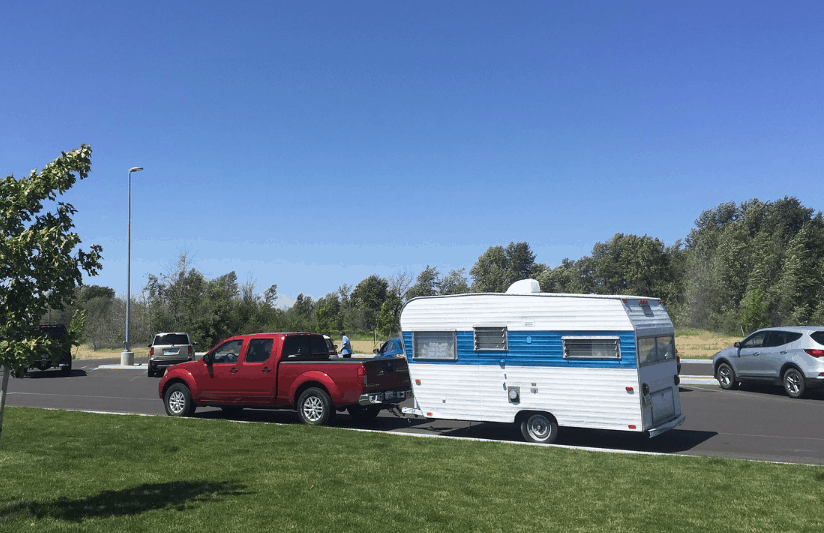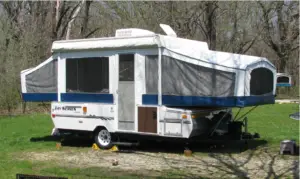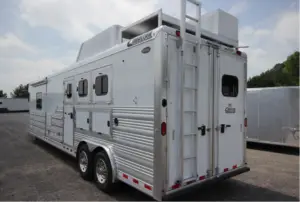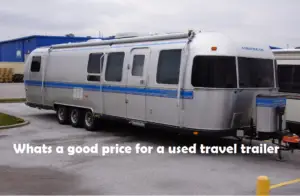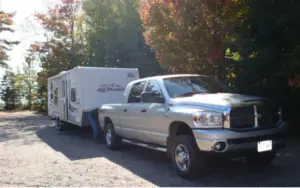Camping in the outdoors and spending time in nature, has become increasingly popular with many people. People find it the ideal way to get away from the stresses of daily life.
For them, it is the ideal way to relax completely and rejuvenate their bodies, both physically and emotionally. There are wide variety of campers and RVs available to choose from. RV manufacturers roll out new models every year. You get motorhomes, trailers that are costly and also high maintenance.
Truck campers and travel trailers are the two options that are extremely popular with many people. Both can be bought at lesser cost and are available in abundance. Travel trailer can be high cost as well.
However, each family and individual have their own specific preferences, wants, and needs.
Lets explore pros and cons of both travel trailers as well as truck campers. Following are major differences between a truck camper and travel trailer to make things easier for you.
What is a Truck Camper?
A truck camper is basically a portable RV that is put onto the bed of a truck. It isn’t even classed as an RV in 42 states. It is the smallest RV available, falling instead, into the category of cargo. Despite its small size however, the truck camper is incredibly convenient! Lets see truck campers advantages and disadvantages.
1. Best for smaller families.
Truck campers are ideal for at most 4 people rather than larger families. Being as small as they are, you can camp and boondock in smaller, tighter, more rustic areas.
2. Easy to park.
One nice thing about a truck camper, is that when it’s not being used, you can simply park it quite comfortably in the driveway on your property.
3. They are convenient.
With their slide outs that can be used to make more room or put away to make traveling more convenient, truck campers are the most versatile on the market.
4. They offer many of the benefits of RVs and motorhomes.
For example, they can provide large dry baths, queen beds, and large kitchenettes. And this is without the inconvenience of hauling around a big caboose.
5. Cheaper.
Truck campers are frequently a lot cheaper. This is because they are classified as cargo and not RVs in 42 of the 50 states in the country. This means that registration fees don’t apply and insurance rates are significantly lower.
6. Parking a truck camper outside restaurants, stores, or at home takes up hardly any space at all.
In fact, it will fit into two parking bays quite comfortably. This cancels out a lot of frustration and stress for you and others on the road.
7. Easy to drive.
For some, driving a fifth wheel, travel trailer, or RV can be a bit intimidating. A truck camper on the other hand, is more like driving a big truck. Making it nice for first-timers and those who prefer to be less conspicuous on the road.
8. Less maintenance.
The maintenance needed for a truck camper is basically the same as repairing a truck, making it less expensive to maintain than other campers and RVs.
9. Less depreciation.
Truck campers hold onto their value exceptionally well even more so if they have been looked after properly. Unlike some other campers and RVs, you will get an amount closer to the original price you paid, should you ever want to re-sell it.
10. Price per square foot costs significantly more than other campers.
($150 per sq. ft. as compared to travel trailers that are only about $100 per sq. ft.).
11. It is more difficult to hook and unhook a truck camper when you are going about your day. Also, you must make sure that everything is stored and tied down in your truck camper before you take to the road.
12. Storage limitations.
Truck campers have limited storage and cargo space, unlike a travel trailer, where the entire bed of the truck can be used to carry things.
13. Limitted Mobility.
One of the downsides of a truck camper is that it does not have the mobility of other RVs. This makes it difficult to drive on back roads, since it is not built or meant to be used for off-road driving.
14. The camper and cab in truck campers are entirely separate, unlike those in RVs. This means that you can’t move about freely in your living space when you come to a stop. You will have to get out of the cab to be able to move from one to the other.
15. Space limitation.
Being as small as it is, a truck camper is fine for sleeping, but the space is limited and can make moving around a bit difficult.
16. Driving Issues.
Because of the way they are attached to a truck, they bump around a lot when driving on the road. Thus, they tend to get run down and beaten up faster than other RVs.
17. Height Problem. These campers can sometimes be as high as 12 to 13 feet. This can be a problem if you have to keep looking out for low branches when you want to park. If this is an issue for you, you can always find a camper that is shorter.
What is a Travel Trailer?
Each person thinks differently about travel trailers. Some seeing them as pop-up campers, lightweight haulers, toy haulers, and so forth. However, a travel trailer is basically any type of adventure vehicle that can be attached via a ball hitch to a standard car and then transported to a camp site.
1. Travel trailers are often seen as a starter pack for those wanting an RV, because they are a lot less expensive. Their cost ratio per square foot compared to truck campers is a lot better too. Here is an article that discusses cost of owning different types of RV’s.
2. They are easy to attach and unhitch when you want to use your towing vehicle to run errands or do some exploring.
3. Insurance costs are normally extremely reasonable and affordable. This can be as little as $200 per year or even less. RV insuracne cost completely depends on the type of RV.
4. Good mileage.
Gas mileage or mpg is frequently a lot better with a travel trailer. Even though the average gas mileage of your towing vehicle is lowered while towing your trailer. It’s still better than that of a driven or motorized RV.
5. Money is saved in the long run.
since there are no mechanical issues, because the travel trailer is not motorized. It means too, that a used travel trailer’s chances of being bought and sold are much better than those of a used truck camper, which is hard to find in good condition.
6. The travel trailer and towing vehicle are separate, meaning that you can repair or replace each of them separately.
7. Maintenance and repairs to a travel trailer are more convenient
since you can simply drop it off and still have your towing vehicle to use in the meantime.
8. There is a wide variety of different types of travel trailers available, so you are sure to find the one that suits your needs best.
9. Easy to customize. With the many different styles, designs, brands, colors, and so forth to choose from, you can do countless things to customize your travel trailer to suit your wants and needs.
10. Unlike a truck camper, you are not allowed to have people in the travel trailer while you are on the road.
11. Maneuverability is easy.
Since you are towing your trailer, you will find it hard to do what you want it to do when you need to maneuver it into a camp space.
12. Long set up time. It takes longer to set up or tear down camp with a travel trailer. You need to hook it up to your towing vehicle. Ensure that all the wiring and chains are properly in place. And then do the same to unhitch it. Depending on how involved things are, this can be quite time-consuming.
13. Trailers are hard to maneuver in and out of tight spaces, so your campsite options can be limited.
14. Storage is hard.
When you’re not using your travel trailer, you need to store it somewhere, either on your property, or in the street if it is legal. This can become quite an issue, because some trailers do take up quite a bit of space.
15. A travel trailer can be a bit of a problem if you are running an errand, eating at a restaurant, or are out shopping. Although there are times when you can’t avoid doing this, it can be an issue, since finding a place to park such a big, bulky vehicle can be difficult.
16. Security for travel trailers are not always reliable, which makes them a lot easier to be broken into than motorhomes. Sure, you can add some security measures of your own, but most of these products are either cheap or extremely easy to break into.
Since security is such a problem with a travel trailer, it is essential to hide expensive personal items somewhere outside your camper when you are not there.
17. Driveable RVs and motorhomes are a lot easier to keep at a certain temperature, similar to regular homes. One can use the built-in A/C to keep the temperature controlled while you are traveling along the road.
You cannot do this with a travel trailer however, so the temperature is sure to be either unbearably hot or icy cold, depending on the weather you are traveling in.
Conclusion
You might think that there is no possible way of finding the right RV to suit the needs of you and your family, especially when there are so many different types available to choose from.
However, when you consider the differences, similarities, and workings above, between travel trailers and truck campers, you will be a lot closer to finding the one, both new, and used, that suits your needs perfectly.

